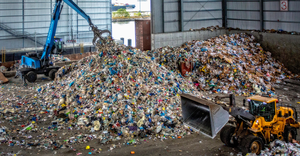Bag the Idea
January 1, 2005
Patricia-Anne Tom
PAPER OR PLASTIC? If some San Franciscoans get their way, residents soon might want to choose neither.
To reduce the number of discarded plastic bags, San Francisco's Commission on the Environment is weighing whether to urge the city's mayor to impose a 17-cent fee on grocery bags — both paper and plastic — provided to shoppers. The fee would be charged to grocery stores and no doubt would be passed onto consumers.
San Francisco's Department of the Environment (DOE) says the ordinance would mitigate the negative effects from bag disposal and help develop bag recycling and reduction programs. San Francisco customers bring home about 50 million bags per year. This accounts for 2 percent of the city's waste and has an annual cleanup cost of about $8.4 million, or 17 cents per bag, according to DOE figures. Cost estimates were based on expenses from removing bag contamination from recycling equipment; removing plastic bag contamination that reduced compost sales; bag collection and disposal; street cleaning; and future landfill liability costs.
Reducing pesky bag waste sounds like a good idea. However, it seems the DOE neglected to calculate the costs of implementing the program. The proposed law would require supermarkets to submit an annual report summarizing their revenues and expenditures. So stores would have to absorb additional bookkeeping expenditures. But there's no indication of how the DOE would ensure that stores are accurately reporting their numbers. And how would self-check out lines be monitored to ensure that customers aren't shoplifting bags?
Opponents of the ordinance also argue that the fee would affect low-income consumers the most, plus hurt businesses such as composite wood and plastic lumber companies that rely on recycled plastic bags. Indeed, we've created ways to recycle plastic waste, and the proposal sounds like it would undermine supplies to the recycling system.
So perhaps San Francisco should rethink its incentives to reduce bag consumption. A similar plastic bag fee imposed in Ireland spawned a big jump in both paper bag use and sales of plastic trash bags, Donna Dempsey, spokeswoman for the Film and Bag Federation, recently told The San Diego Union-Tribune.
As an alternative, consider Safeway's campaign years ago to reduce plastic bag use in Hawaii. Shoppers could purchase a canvas bag from the grocery store. Then, every time they brought the bag in to carry subsequent purchases, they would receive a small rebate.
The road to waste reduction is paved with good intentions. But before bagging bag waste, the city should more carefully evaluate the rewards.
The author is the editor of Waste Age
You May Also Like


